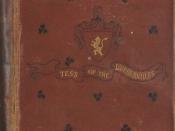Ladies and Gentlemen,
19th Century Britain was an innovative period, catalyzed by the industrial revolution, which altered many of society's values. It is during this period of change, observant authors reflected their attitudes towards prevailing social values, praising and criticizing them through their texts. Thus it is through the analysis of these texts, can we appreciate the author's observations of the 19th century society. One such text is the 1891 novel "Tess of the D'Urbervilles" with the 'observer', Thomas Hardy, cleverly questioning society's outlook upon the purity of women and the dogmas of religion through ingenious characterization, 'poetic' voice and various literary techniques in the text.
Undoubtedly, you will recognize that one of Hardy's major observations in the 19th century is the value of chastity and purity in women. This value is depicted vividly in "Tess of the D'Urbervilles" through the effective characterization of Tess, who is portrayed as the essence of society's (chaste or valued) female figure, being "Untinctured in experience" and "a picture of honest beauty, flanked by innocence".
Interestingly, Tess is also referred to as "Artemis" by Angel in the novel, arguably this allusion of "Artemis" the virgin patron of childbirth from Greek Mythology, emphasizes the existence of society's value that women should be chaste, which is further reinforced by the opposing Phase titles of "Maiden" and "Maiden no more" notifying the responder that the novel's plot revolves around this value and hence emphasizing its significance in 19th century society. Evidently, a detailed emphasis upon the value of purity and chastity in women is provided in "Tess of the D'Urbervilles", hence indicating to us that Thomas Hardy made insightful observations on this 19th century value.
Personally, I believe these insightful observations lead Thomas Hardy to attain a critical attitude towards the 19th century value...


